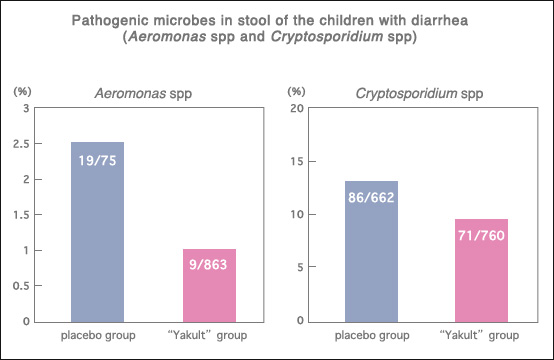News Releases
Daily Intake of "Yakult" is Efficacious in Reducing the Incidence of Acute Diarrhea in Young Children
~Collaborative Study with India National Institute of Cholera and Enteric Diseases~
YAKULT HONSHA CO., LTD. (Mr. Sumiya Hori, President) announced that the collaborative study on the incidence of acute diarrhea with National Institute of Cholera and Enteric Diseases in Kolkata, India showed that daily intake of “Yakult” is efficacious in reducing the incidence of diarrhea in young children.
An unprecedented large-scale, study involving 3,585 children residing in urban slum community in Kolkata, India was conducted. As a result, “Yakult“ was shown to be efficacious in reducing the incidence of acute diarrhea in young children and the difference was statistically significant. The demonstration that the continued intake of "Yakult" is effective in improving the gastrointestinal symptoms of the general public strongly corroborates the significance of drinking "Yakult."
These results were published in the “Epidemiology and Infection” website and the equb is available on Pubmed.
YAKULT HONSHA is engaged in research on probiotics, which refer to living microorganisms that confer a benefit on the host (people, etc.) by improving the balance of intestinal flora. A representative probiotic strain is Lactobacillus casei strain Shirota (YIT9029), which in addition to an intestinal regulation action, it has been verified in many published papers to have immunoregulatory actions such as helping to suppress the recurrence of superficial bladder cancer and reduce allergy symptoms. Hereafter, YAKULT HONSHA will continue to actively promote research on utilizing the remarkable power of microorganisms for the benefit of people's health.
Overview of the Study
The number of children aged 5 years and under that die annually throughout the world is 8.80 million, and the country that has the most deaths is India (approximately 1. 83 million children per year). It is reported that diarrhea is the cause in 13% of the deaths in children aged 5 years and under in India (Black RE et al, Lancet. 2010. 375: 1969-1987).
A double-blind randomized controlled field trial involving 3,585 children aged between 1 and 5 years was carried out in Kolkata, India. The participating children were given either “Yakult” or a placebo drink daily for 12 weeks to observe the incidence of acute diarrhea and pathogenic microbes in the stool.
The results showed that the proportion of children suffering from diarrhea was significantly lower in the “Yakult” group (608 out of 1,802) compared to the placebo group (674 out of 1,783). Moreover, the incidence of diarrhea was lower in the “Yakult” group (0.88/child/year) compared to the placebo group (1.029/child/year) and the difference was statistically significant (p<0.01). The analysis of pathogenic bacterial, viral and parasitic agents in the children with diarrhea resulted in the lower detection rate of Aeromonas spp and Cryptosporidium spp in Yakult group compared to the placebo group.
*The placebo drink did not contain Lactobacillus casei strain Shirota.The taste and color of both the placebo drink and “Yakult” were similar.By comparing the effects of intake of each drink,the efficacy of “Yakult” can be scientifically measured.
【Reference Material】
1.Incidence of diarrhea
The results showed that the proportion of children suffering from diarrhea was significantly lower in the “Yakult”group(608 out of 1,802) compared to the placebo group (674 out of 1,783). The incidence of diarrhea was lower in the “Yakult”group(0.88/child/year) compared to the placebo group (1.029/child/year) and the difference was statistically significant(p<0.01).
| Number of participants | Incidence/child/year | |
| “Yakult” | 1,802 | 0.88* |
| Placebo | 1,783 | 1.029 |
| Total | 3,585 | ─ |
*;p<0.05, vs.placebo
The analysis of pathogenic bacterial, viral and parasitic agents in the children with diarrhea resulted in the lower detection rate of Aeromonas spp in the “Yakult” group(9 out of 863, or 1.0%) compared to the placebo group(19 out of 750, or 2.5%)(p<0.05), as well as the lower detection rate of Cryptosporidium spp in the “Yakult” group (71 out of 760, or9.3%) compared to the placebo group(86 out of 662, or 13.0%)(p<0.05).
The detection of other pathogenic microbes was similar between the two groups.

- Home
- /
- News Releases
- /
- Daily Intake of "Yakult" is Efficacious in Reducing the Incidence of Acute Diarrhea in Young Children ~Collaborative Study with India National Institute of Cholera and Enteric Diseases~

